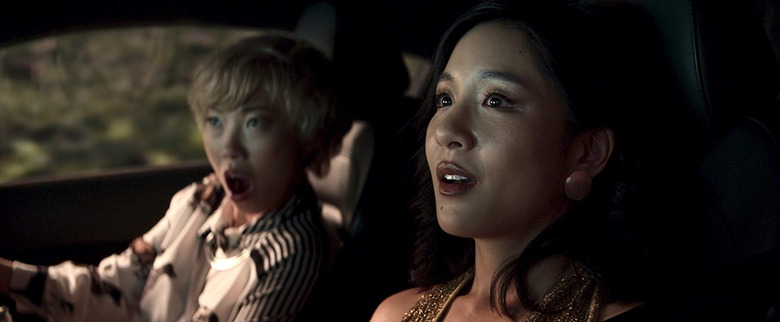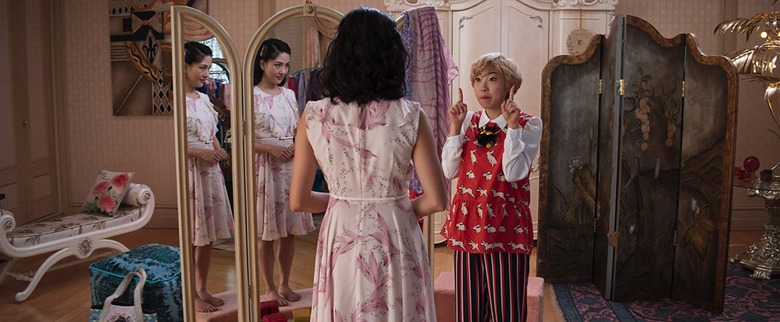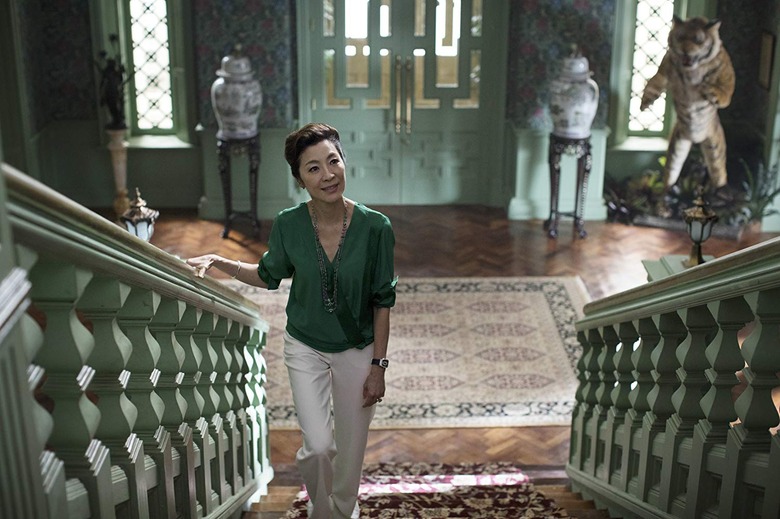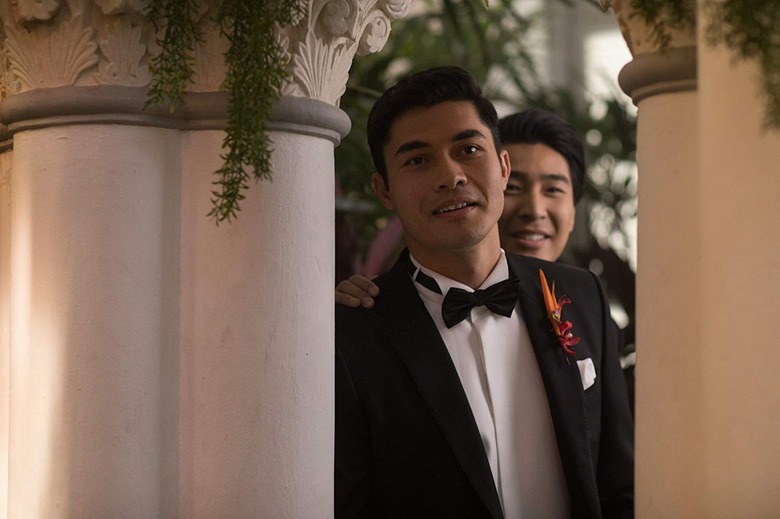'Crazy Rich Asians' Spoiler Review: Making The Unfamiliar, Familiar Through Rom-Com Tropes
(In our Spoiler Reviews, we take a deep dive into a new release and get to the heart of what makes it tick...and every story point is up for discussion. In this entry: Crazy Rich Asians.)
"China is a sleeping giant. Let her sleep, for when she wakes she will move the world." That is the rather grandiose Napoleon Bonaparte proverb that Crazy Rich Asians opens with, setting the stage for a wild, escapist fantasy of a film that is both keenly aware and uncaring of the burden it carries. Crazy Rich Asians knows it presents a landmark moment for Asian-Americans in film, and right off the bat, it declares its intentions. It's a weighty promise for Jon M. Chu's romantic-comedy to live up to — but does it live up to it? Yes, and no.
On a barebones level, Crazy Rich Asians doesn't quite shake the world. It's a romantic-comedy that follows a standard meet-the-parents set-up, with an outrageously wealthy twist. But add in the all-Asian cast and Asian-American heroine, and you've got something revolutionary.
Like the hit YA coming-out film Love Simon earlier this year, Crazy Rich Asians feels miraculous because it is so normal. (Well, as normal as billion-dollar designer purses and jet-setting lifestyles can be on the big screen.) Crazy Rich Asians doesn't treat its subjects like exotic curios or tragic ciphers, but like typical characters in a romantic-comedy. The genre — once so familiar to cinemas, but now a rare entity — provides an easy access point for general audiences, while allowing Asian-Americans to see themselves on the big screen as more than just the quirky supporting character or emasculated goon.
But more important to Crazy Rich Asians than being the paragon of Asian-American representation is that it is just goddamn entertaining. Just as Crazy Rich Asians wears its intentions on its sleeves, so does it wear its rom-com influences — Chu throws in nods to everything from Devil Wears Prada, to Pride and Prejudice, to Korean soap operas. The film becomes a hodgepodge of rom-com tropes that sometimes comes off as frenetic, but in the end only creates a fuller, richer experience. For an Asian-American rom-com lover like me, watching the movie was like biting into an ice cream sandwich and finding a delicious caramel center — I get the best of my favorite genre in a story about people who look like me.
A Cinderella Story
Constance Wu's Rachel Chu is the perfect Everywoman. An accomplished NYU economics professor who Wu infuses with a self-aware charm, you can see just how grounded she is in her mom's tupperware lunches that she packs for the plane ride to Singapore with her dreamy boyfriend Nick Young (a blandly engaging Henry Golding), and in the jokes she makes about JFK being filled with "salmonella and despair." Rachel is an average Chinese-American who has never been further East than Queens, and it's easy to see her story — of a scrappy, daughter of an immigrant who is suddenly thrust into a world of immense riches — as a sort of Cinderella story. But the prince at the end of the story is ultimately tertiary to Rachel's actual arc of self-actualization.
The film smartly kicks off Rachel's story not by showing her Everywoman charms, but her smarts. She's an expert in game theory, which she proves when she easily bests her TA in a game of poker at her NYU lecture hall. Because while Crazy Rich Asians delights in pushing Cinderella fairy tale imagery, the film itself is more of a cat-and-mouse game between Rachel and Nick's disapproving mother, Eleanor (a spectacular Michelle Yeoh).
Eleanor cuts an intimidating figure right from the beginning of the film, but is never situated as the outright villain. Her introductory flashback, set in 1995, is the only time the film features white characters in speaking roles and, not inconsequentially, is the only scene in the film that deals with racism against Asians. Wet and bedraggled, Eleanor is sneered at by a group of British hotel managers who deny her the right to stay in her suite, suggesting that her family explore Chinatown instead. Seething with elegant rage, Eleanor manages a coup: calling her husband, who buys ownership of the hotel, allowing her to utterly humiliate the managers. It's a moment of righteous vindication that speaks volumes — endearing us to Eleanor's plight while at the same time establishing her as a fierce woman who has a reason for being suspicious of Westerners. Enter Rachel.
Arriving in Singapore wide-eyed and newly aware of her boyfriend's secret wealthy family, Rachel is still completely unsuspecting of the bloodbath she is about to enter. Unfortunately, Crazy Rich Asians seems reluctant to get to the meat of the movie, slowly setting us up for the grand reveal of Nick's awesome wealth. But we do get a lot of actual meat — Chu turns a loving eye toward the delectable street food of Singapore, which Nick, his friend Colin Khoo (Chris Pang), and Colin's bubbly bride-to-be Araminta (a winning Sonoya Mizuno) take Rachel on a whirlwind tour of. It's telling that this sequence is granted as much flamboyance as Chu's overtures toward haute couture — because in the world of the wealthy Singaporean elite, food and fashion are equally important.
Dumplings Over Flowers
K-drama and J-drama fans, stop me when it rings a bell: A lower-class girl enters the glitzy world of the wealthy elite where she clashes with the pretentious snobs who bully and intimidate her. There's a glamorous romantic foe, a scheming rich mother, and a group of suave bros being bros. Yes, I immediately thought of the popular Japanese television drama Hana Yori Dango, and its Korean remake Boys Over Flowers, too, as Crazy Rich Asians rolled into its second act. As many tropes as Crazy Rich Asians shares with its rom-com forbears, it also makes quite a few nods to the hugely popular K-drama craze. These dramas are often centered around wide class divides, with a scrappy heroine going up against wealthy, upper class villains who are standing in the way of love, career, happiness, or all of the above.
It's most apparent when the film reaches impossibly soapy heights, like during the two-pronged dramatic reveal at the Colin and Araminta's bachelor and bachelorette parties, respectively. Just as Nick shows Colin the ring he intends to propose to Rachel with, much to Colin's concern, Rachel learns from Nick's ex Amanda (Jing Lusi) that she is the one keeping Nick from assuming his rightful place at the head of his father's billion-dollar company. The reveal ends in — what else — a bloody, gutted fish left as a warning to Rachel on her bed. The sequence provides a sudden jolt to Crazy Rich Asians, which until now has been lazily cruising by on wealth and food porn. But it also becomes a dangerous turning point for the film, as Crazy Rich Asians teeters on the brink of all-out soap opera madness. But thankfully, thanks to the subversion of one particularly prevalent trope of K-dramas, the movie takes steps beyond its rom-com structure.
One of the most common tropes of these dramas is the character of the evil stepmother who only cares about status, wealth, and power. But Yeoh's complex and multi-faceted matriarch Eleanor Young is much more than that.
She wasn't like that originally. In Kevin Kwan's novel, Eleanor was a much more shallow antagonist who schemes against our heroine from the beginning, and goes to horrible depths to maintain her son's wealth and status. But when Yeoh signed on to the film, she told Chu, according to IndieWire, that she refused to take the role if the film portrayed Eleanor as deliberately underhanded. "'I can't be mustache-twirling," Chu recounts Yeoh saying. "I need to make this person a full human being, and I'm going to defend our culture in the best way possible, and you defend the American culture, and we'll let the audience decide.'"
In the film, Eleanor seems willing to give Rachel a chance — at first. Their first meeting in the bustling kitchen of the Young estate is a blast to watch, as Rachel makes all the wrong moves with an already suspicious Eleanor. Rachel gives Eleanor an awkward hug, Rachel stumbles between calling her Mrs. Young or the more familiar Auntie, Rachel mistakenly boasts about her career passions. But Eleanor understands. Rachel is American.
That brief meeting essentially dooms Rachel in Eleanor's eyes. Rachel is not just undeserving of Nick, but she's not deserving of occupying the same space as Eleanor. Because Eleanor had gone through exactly what she was putting Rachel through with her own mother-in-law, Ah Ma (The Joy Luck Club's Lisa Lu). When the Young family sits down to make dumplings (a culturally specific scene that Chu added to the film), Crazy Rich Asians deepens our understanding of Eleanor. She was not Ah Ma's choice to marry Nick's father, and thus had to prove herself worthy by sacrificing her law career and even her relationship with Nick — and yet was never able to truly earn Ah Ma's approval, as evidenced by Ah Ma's terse dismissal of Eleanor's handmade dumplings and by Eleanor's glinting emerald ring that Nick's father had given her in place of the family ring. It adds another layer to Eleanor's harsh insult to Rachel. "You will never be enough," Eleanor coldly says, cupping Rachel's face, referring to her class, her behavior, and her selfish American ideals. But Eleanor may well be talking about herself.
The Devil Plays Mahjong
The game begins. After Rachel unloads her woes on her Singaporean college friend Peik Lin (a hilarious, scene-stealing Awkwafina), the two of them come to a conclusion that Eleanor's put-down was not a defeat but a challenge. And just as smoothly as Crazy Rich Asians entered K-drama territory, it slides back into rom-com land, blessing us with a Devil Wears Prada-worthy makeover scene, complete with a Stanley Tucci-channeling Nico Santos. The graceful way that the film navigates genres is not only entertaining as hell but feels like another cross-cultural achievement where American rom-coms and East Asian dramas form the perfect marriage.
Of course, unlike the standard rom-com makeover scene, the sequence in Crazy Rich Asians isn't meant to shape a shy, unfashionable Rachel into society's ideal woman, but to empower her. With the help of Peik Lin's gaudy, nouveau riche family (a delightful Chieng Mun Koh, a less delightful Ken Jeong) and Nick's cousin Oliver (Santos), Rachel finds the strength and the perfect dress to face the wolves at Colin and Araminta's wedding.
What follows is power move after power move — in between moving shows of love between Rachel and Nick and a wedding ceremony that lives up to the "crazy rich" title — with Rachel impressing the Aunties and Nick's friends ("She's a fighter," Colin remarks admiringly to Nick), and getting under Eleanor's skin. But the film pulls another dramatic reveal on you just as you begin to settle into the celebratory atmosphere. Crazy Rich Asians reverts back to its soapy trappings when Eleanor reveals that her private detective has found that Rachel's dead father is very much alive, and that she was born out of an affair. The film very nearly suffers from the soapy twists, all of which come straight out of Kwan's novel. But Chu doesn't seem as interested in playing up the drama as he is in what comes of it: a touching reconciliation between Rachel and her mother Kerry (Tan Kheng Hua), and a glimpse of Kerry's immigrant struggles. For all of the film's dedication to wealth porn, at its heart, the immigrant experience remains essential.
It's Rachel's status as the daughter of an immigrant that she proudly claims in the climactic stand-off with Eleanor at, fittingly, a mahjong table. Easily the best, most riveting scene in the film, the mahjong game is another film-only addition by Chu that perfectly hones in on the story's core exploration of Asian-American identity. The entire scene is loaded with meaning and tension, as the mahjong tiles clatter and exchange hands like a ballet, or better yet, like a battle. The game isn't simply over Nick or even over Rachel earning Eleanor's approval, but over Rachel's reconciling the two sides of her cultural identity. Rachel reveals that she made the painful decision to turn down Nick's proposal and gives up the tile that Eleanor needs to win, leaving her with the victory and with devastating kicker that when Nick ultimately marries a woman worthy of him, "it will be because of me. A poor, raised-by-a-single-mother, low class, immigrant nobody." With that, Rachel leaves and shows her tiles: she had the winning hand all along.
Love, Actually
Having given up Nick but maintained her "dignity," as Peik Lin respectfully states, Rachel boards a plane back to America with her mother. And naturally that leaves us with the most rom-com ending of all: a plane chase. Nick runs to Rachel's side, comedically weaving through resentful passengers all the way, to plead with her to stay. She remains resolute in her decision until he whips out a ring —not the first one he proposed with, but his mother's emerald ring. Overjoyed at receiving Eleanor's tacit approval, Rachel immediately accepts, leaving the audience to piece together Eleanor's unspoken intention.
It's an astonishingly subtle end to a flashy film — though of course, we get a flashier party scene to cap it all off. And it almost feels unnecessary. It all comes down to the power of the mahjong game, where Rachel comes to terms with her identity as an Asian-American, and proves that she doesn't need someone else's approval to know her worth. The film could have ended right there and left the same impact (again, Nick is pretty but peripheral), but Crazy Rich Asians is still a rom-com, and we need to have our rom-com ending. And there's no denying the satisfaction that comes when Rachel wears that emerald ring.
If you noticed that I managed to make it through the entire spoiler review without touching on a prime subplot of the film, it's for good reason: Astrid (Gemma Chan) and Michael's (Pierre Png) troubled marriage was the weakest part of Crazy Rich Asians. It's a storyline that could have been excised from the film completely, and probably should have — if not for the promise of a sequel and Gemma Chan's boundless charisma. Png, on the other hand, was another story — there's a reason he was introduced abs-first. In a cast chock full of talent and standout performances, Png's wooden performance did nothing to help a subplot that had no relation to the rest of the film. I couldn't help but think that if it had been tweaked a little, Astrid could have become an intriguing parallel to Rachel's story of self-actualization, but it would have padded an already lengthy run time. It really is a storyline best saved for a sequel.
So what of the future? Crazy Rich Asians handily sets itself up for a sequel (and there are two more entries in Kwan's series). But as it is now, Crazy Rich Asians offers a vibrant, wildly entertaining, and achingly sincere portrait of a rarely represented culture. As for that weighty proverb, Crazy Rich Asians doesn't necessarily "move the world." But it does nudge it in the right direction.




